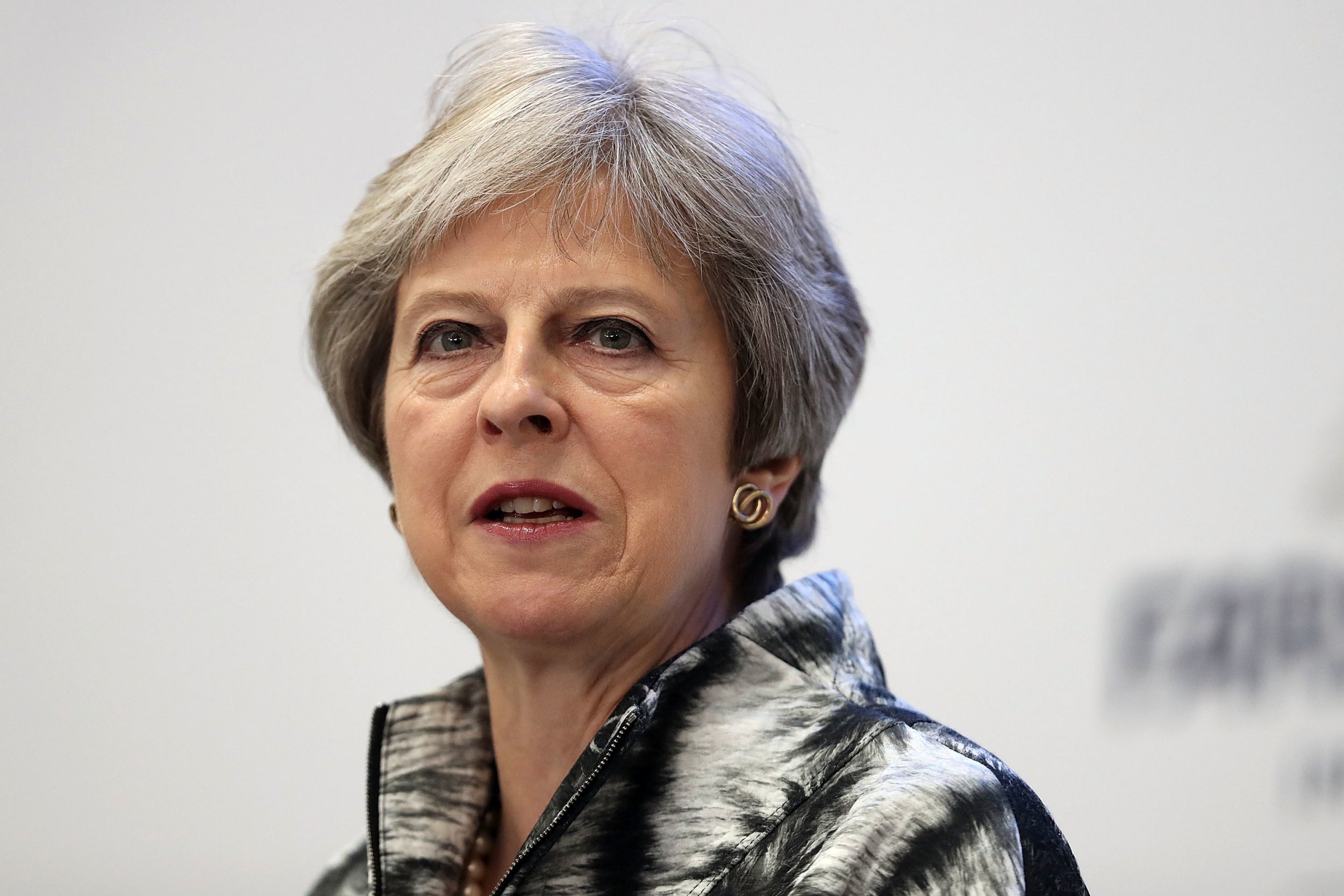The Tory Party can hardly claim they are 'pro-business' when they are royally screwing them over with Brexit
In the last couple of years, the Tories have achieved a quite remarkable feat: not only have they managed to reinforce their stereotype of being anti-worker, but now they are increasingly seen as anti-business too


Your support helps us to tell the story
From reproductive rights to climate change to Big Tech, The Independent is on the ground when the story is developing. Whether it's investigating the financials of Elon Musk's pro-Trump PAC or producing our latest documentary, 'The A Word', which shines a light on the American women fighting for reproductive rights, we know how important it is to parse out the facts from the messaging.
At such a critical moment in US history, we need reporters on the ground. Your donation allows us to keep sending journalists to speak to both sides of the story.
The Independent is trusted by Americans across the entire political spectrum. And unlike many other quality news outlets, we choose not to lock Americans out of our reporting and analysis with paywalls. We believe quality journalism should be available to everyone, paid for by those who can afford it.
Your support makes all the difference.When I studied politics at school, we were taught that the Conservative Party had traditionally been seen as the party of the rich, the upper class and, above all, business interests. Labour was the party of workers, employees and trade unions.
As Labour’s shadow business secretary from 2011 until 2015, I found I had to constantly battle against these stereotypes when dealing with leading figures in business, the City and industry. They often presumed we were not at all well disposed to them. It helped that I had worked in the private sector – acting as a solicitor to firms, large and small, for the best part of a decade – but it was still an uphill struggle. We were never given the benefit of the doubt unlike my opposite numbers on the other side of the House, where the presumption was the Tories always wanted to help. No doubt, Conservative ministers who actually care what the labour movement thinks of their policies (they are not in huge supply), would have the same complaints when it comes to engaging with our trade unions.
Two years ago I looked on with amusement as Theresa May, in her early days as prime minister, tried to ape Labour’s responsible capitalism agenda (with, for example, stronger regulation of utility prices, action on rogue landlords and so on) and her being met with a whimper by captains of industry. When we had announced similar plans it had led to us being loudly condemned as revolutionaries in the lead up to the 2015 general election – David Cameron said, “I know you want to live in some sort of Marxist universe where you can control these things but you need a basic lesson in economics.”
But these orthodox views of the characteristics of the main parties are in the process of being shattered quite fundamentally, none more so than when the Tories claim to be pro-business.
As I have said before in this column, I subscribe to Keynesian economics and believe that a “social market” model – where the private and public sectors work in partnership together – provides the best vehicle through which we can build a more equal, fair, democratic, sustainable and prosperous society. The private sector, made up of businesses, is a crucial part of this jigsaw and we should be unapologetic about what we are looking for. The kinds of businesses we want to see more of – if we are to secure sustainable growth that everyone can share in – are innovative, productive firms that invest for the long term in an inclusive and socially responsible way.
Business commentators like to divide the parties up into those who are “pro” and “anti” business – it is a pretty crude and facile distinction. The truth is businesses are nothing without their employees and vice versa. So, you cannot be pro-business if you constantly attack the rights and representative organisations of the people who make your businesses what they are, and you can’t be pro-worker if you don’t back the businesses that create decent jobs and keep those workers in employment. In the last couple of years, the Tories have achieved a quite remarkable feat: not only have they managed to reinforce their stereotype of being anti-worker, but now they are increasingly seen as anti-business too. Why?
Workers rights have never been the Tories’ strong point. Whenever they take office, they cannot help but dismantle your fundamental rights at work. For example, since 2010 they have made it harder to claim for unfair dismissal and wanted to make it harder still to enforce your rights through the introduction of employment tribunal fees (which were struck down as unlawful by the Supreme Court). They watered down the statutory remit of the Equality and Human Rights Commission and then there was the notorious Trade Union Act that sought to systematically attack and weaken our trade unions. The former Tory minister and chair of the Education Committee, Robert Halfon, has been remarkably candid about this in his Demos pamphlet, “Stop The Union-bashing”, where he said that at times his party has allowed Commons debates to “become an excuse for blood lust against the trade union movement”. He even says, “If I were the Labour party, I would use these debates in party political broadcasts to show ‘the nasty party’ at work once again.”
Yet, businesses now think the Tories have it in for them too. I spoke to one leading figure in the City last week who said he believed the current government has been the worst for business that he can remember. He pointed to two factors, one being Brexit and the other, connected to that, is their sheer ineptitude and incompetence in their management of the economy. He is not alone – many FTSE 250 chief executives and directors whose default setting would be generally supportive of any Tory administration say the same.
I often struggled to get business figures to come out publicly to back the Labour Party. That is partly why I refused to play the game of getting a number of industry figures to sign letters in the Financial Times in support of our policies because the business unit at No 10 under Cameron could always cook up more. But they are queueing up to lambaste the Tory government. Last weekend, more than 100 founders of the best known brand names including Innocent Drinks, Zoopla, YO! Sushi, Jack Wills and Pret a Manger signed an open letter stating that the prime minister’s Brexit proposals “would amount to the British government tying the hands of British business”. Airbus, BMW and Jaguar Land Rover’s comments about the abominable handling of our exit from the EU and the failure of government to cohere around any position are well known. This has not been helped in recent days by the Chequer’s proposals – the PM can chant as many times as she likes that they are a good deal for the UK but she is royally screwing services businesses by leaving them – 80 per cent of our economy – out of her plan. One well-known business leader, in exasperation these last few months, texted to ask, “How are these ideological extremists getting away with their deliberate falsehoods?” It is a question I’m frequently asked.
Instead of listening, senior cabinet ministers have gone on the attack. The former foreign secretary said “f**k business”, while his successor said it was “completely inappropriate” for business to air their concerns on government policy. It is hard to state quite how unprecedented this state of affairs is. They arrogantly presume that traditional orthodoxy will reassert itself and business will come back to fold, whatever hell these chancers unleash on our country, but all the signs are that this will not be the case. They will not easily be forgiven for what they are doing to our economy and our country.
Business figures have joined the growing mass of people who want to see our country do well, want to make a positive contribution to our society and who feel politically homeless. So there is a golden opportunity here to reset relations and, who knows, put together a national consensus that can unite both business and employees. We must grab it.
Look to football for the best of Britain
What a summer of sport it has been. Wimbledon is over for another year. The World Cup has finished after a tournament full of amazing goals and celebration – finally something we can all feel good about and a welcome distraction from dismal daily news on Brexit and Trump.
But is there anything this generation of England footballers can tell us about our country? While the political debate in Westminster raged about immigration and borders, the England team were embraced by the whole nation. But, from the starting 11 of the England squad, only five would be left if first and second generation immigrants were removed from it. This is a team at ease with modern multicultural Britain because it is a product of it. A team that embraced their different skills and worked together to create something greater than the sum of their parts. And a team that has excelled and been celebrated by everyone. Perhaps there is something we can learn here?
The victorious French team are similarly representative of the modern French republic. France’s World Cup winning team features 15 players with African roots, including Kylian Mbappé, the goal scoring sensation whose mother is from Algeria and father is from Cameroon. France was one of the youngest teams at the World Cup, along with England, and showed a new generation on the world stage.
So, while Trump still tries to build his wall and separates families in America, Putin undermines Western democracies, and Jacob Rees-Mogg and Nigel Farage fan the flames of division and fear at home, our English football team shows what modern Britain is and should be about. Openness, multiculturalism, diversity and celebration of our differences. Let’s bring that home.
Join our commenting forum
Join thought-provoking conversations, follow other Independent readers and see their replies
Comments